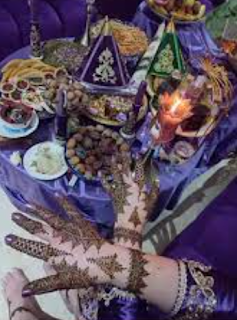In North African folklore - particularly in Morocco and Algeria - the figure of Lalla Malika Zahwania stands out as one of the most fascinating symbols of the unseen world.
She is not merely a legend whispered in village gatherings; she is revered as a "Queen among the Kings of the Jinn" (jinn are supernatural beings in Islamic tradition). Her presence is invoked during mystical rituals such as Gnawa ceremonies and Zar gatherings (both are traditional African-Arabic spiritual ceremonies involving music, dance, and spirit possession), and even in popular folk songs and celebrations.
Some approach her seeking healing, others fear her wrath, while devout Muslims view her with caution, considering any invocation of supernatural beings a forbidden act that opens dangerous gateways into the unseen world.
Who is Lalla Malika Zahwania ?
The name reveals much about her:
- "Lalla" is a Moroccan title of respect for noble women.
- "Malika" means "queen" in Arabic.
- "Zahwania" stems from the Arabic root "zaha," meaning beauty, brightness, and joy.
Thus, Lalla Malika is imagined as an enchanting, joyful, and radiant spirit - one who loves perfume, music, dance, fine clothing, and the color purple. She is said to be exceedingly beautiful, charming but also possessive and easily angered. Her legends oscillate between humor and terror.
Traditionally, people turn to her for three reasons:
Healing (especially from spiritual afflictions known as "mass," i.e., possession), Protection, Revenge against those who wrong them.
However, from an Islamic theological perspective, seeking aid from spirits is considered dangerous and forbidden (shirk—associating partners with God).
A Spirit of Healing
Many believe that Lalla Malika possesses healing powers, particularly for those afflicted by mysterious illnesses or spiritual disturbances.
Several stories are attributed to her:
- A young woman in Fes, Morocco, suffered intense headaches and strange fits until she saw a vision of a white-clad woman who touched her forehead and said, "Go to Lalla Malika." Her pain vanished instantly.
- In Algeria, a barren woman was instructed to sacrifice a light-colored ram at her doorstep while invoking Lalla Malika's name. Shortly afterward, she conceived.
- A shepherd in rural Morocco encountered a strange woman in the fields and fell ill soon after. His recovery only came after sacrificing a black rooster near a shrine believed to be associated with Lalla Malika.
- Some traditional healers (roqya practitioners and chouafas - local spiritual mediums) recount episodes where Lalla Malika allegedly spoke through possessed individuals during healing sessions, demanding offerings like incense or candles before agreeing to depart from the afflicted.
Protector Spirit - or So It Seems
Among some believers, Lalla Malika is seen as a protective force. People claim that maintaining a respectful relationship with her - offering purple candles, burning incense, and visiting shrines such as the one in Marchich near Meknes - brings peace of mind and wards off misfortune.
Yet, within Islamic teaching, this form of "protection" is regarded as illusory and spiritually perilous, as true protection can only come from God.
A Spirit Capable of Revenge
The legends warn that betraying Lalla Malika or forgetting one's vow to her invites dire consequences. It is said that she punishes offenders with streaks of bad luck, nightmares, or even mental disturbances.While some claim that sorcerers can summon her for harmful purposes, traditional narratives insist that she cannot be controlled or enslaved - she retaliates according to her own will, maintaining her sovereignty.
Popular Testimonies
Regardless of skepticism, many people are deeply convinced of her presence.
On social media, testimonies like the following are common:
"Yesterday, after listening to Aissawa chants dedicated to Lalla Malika Zahwania, I was overwhelmed by uncontrollable laughter."
(Aissawa is a Moroccan spiritual musical group known for invoking spirits during their ceremonies.)
Such accounts show how deeply folklore interweaves with daily life. Lalla Malika, for many, is not just an old myth - she explains the unexplainable: sudden misfortunes, recurring nightmares, inexplicable joy, or fear without apparent cause.
Her Influence in Modern Popular Culture
In Music:
Lalla Malika has transitioned from being a purely ritualistic figure to a pop culture icon. Moroccan singer Daoudia released a popular song titled "Lalla Malika," which became a staple in weddings and parties. In some circles, it became a running joke that:
"If you sing it, you might summon her!"
This playful superstition reflects how the mystical has seeped into everyday cultural expressions, blurring the line between sacred ritual and folk entertainment.
In Television:In Ramadan 2025, the Algerian TV series "Al-Tabi’a" ("The Follower") aired on Ennahar TV, loosely portraying a narrative inspired by figures like Lalla Malika.
The story follows a woman named Yaqout who returns to her hometown seeking revenge and becomes entangled in a web of sorcery and forbidden rituals. She forms a "pact" with a mysterious female spirit that grants her power - clearly mirroring traits attributed to Lalla Malika: femininity, beauty, strength, the love of perfumes and purple colors, and a demand for offerings.
The show stirred debate: was it merely artistic storytelling or a dangerous normalization of occult beliefs?
Islamic Perspective on Invoking Spirits
According to Islamic belief, seeking help from jinn or spirits is considered shirk - an unforgivable sin unless repented.
The Qur'an states:
"And there were men from mankind who sought refuge with men from the jinn, so they increased them in burden." (Surah Al-Jinn, 72:6)
Islam emphasizes that healing, protection, and sustenance can only be sought through God, not through invisible forces or mystical beings.
Conclusion
For many, Lalla Malika Zahwania is more than a myth; she is a living reality that materializes in dreams, rituals, and unexplained phenomena.
Yet from a religious point of view, she remains a spiritual trial - a path that diverts from the true reliance on the Divine.
Whenever life’s burdens weigh heavy, remember:
True light is not found through summoning spirits...
but through seeking God alone.









No comments:
Post a Comment